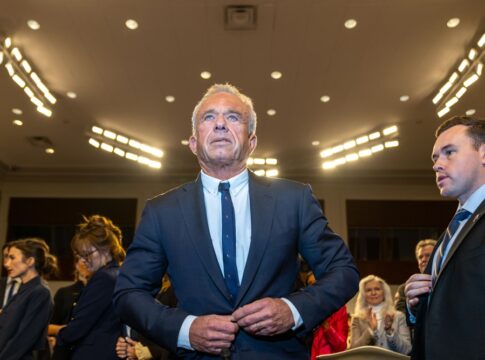This appears to be one of the few times when bipartisan support is likely. Congressional lawmakers want to end tax breaks for pharmaceutical advertising, citing HHS Secretary Kennedy’s campaign against Big Pharma’s direct marketing to patients. Bipartisan lawmakers introduced the No Handouts for Drug Advertisements Act, which would eliminate tax breaks for pharmaceutical direct-to-consumer advertising.
Bipartisan Effort Targets Big Pharma’s Advertising Tax Break
A group of congressional representatives from both parties has introduced legislation aimed at ending a significant tax advantage for pharmaceutical companies. The No Handouts for Drug Advertisements Act would eliminate tax deductions that drug manufacturers currently claim for their direct-to-consumer (DTC) advertising expenses. This initiative aligns with HHS Secretary Robert F. Kennedy Jr.’s ongoing campaign against pharmaceutical advertising practices that many critics argue drive up medication costs and undermine doctor-patient relationships.
The proposed legislation comes at a time when pharmaceutical advertising expenses have reached unprecedented levels. Since the FDA loosened restrictions on DTC pharmaceutical advertising in 1997, industry spending has skyrocketed from $2.1 billion to $9.6 billion by 2016. According to supporters of the bill, eliminating the tax deduction would not only save taxpayers money but potentially help reduce drug prices by discouraging excessive marketing campaigns.
RFK. Jr:
“Today, over 100 Members of Congress support a Bill to fund Ozempic with Medicare at $1,500 a month. Most of these members have taken money from the manufacturer of that product, a European company called Novo Nordisk”
Is this a clear conflict of interest? pic.twitter.com/hlIyhcI9tJ
— Red Line News (@RedLineNewsUSA) March 9, 2025
Kennedy’s Bold Stance Against Pharmaceutical Advertising
Robert F. Kennedy Jr. has taken a firm position against pharmaceutical advertising since his appointment as HHS Secretary. He has previously stated his intention to ban such advertising via executive order, highlighting the unique nature of pharmaceutical products in the marketplace. Kennedy is currently collaborating with President Trump and White House officials to challenge a Supreme Court decision that upholds the pharmaceutical industry’s right to advertise directly to consumers.
Kennedy’s approach emphasizes the financial burden pharmaceutical advertising places on government healthcare programs. His department is reportedly exploring various options to better regulate DTC advertising to protect both patients and taxpayer dollars from potentially misleading pharmaceutical promotions. The administration’s position reflects growing concern that advertising directly to consumers may lead to unnecessary prescriptions and higher healthcare costs.
🔥We may have uncovered the primary cause of wasteful spending in Medicare. According to RJK Jr., the reason Medicare approves exorbitantly priced drugs is that members of the U.S. Congress are influenced by pharmaceutical companies through financial contributions.
For example,… pic.twitter.com/SdSu4LKVWv
— BiffBifford™ 🇺🇸 (@TBifford) April 29, 2025
Evidence Supporting Advertising Restrictions
Several studies reinforce the concerns about pharmaceutical advertising’s impact on healthcare costs. The Congressional Budget Office has found a correlation between increased advertising and higher consumer spending on prescription drugs. Research from the National Bureau of Economic Research reported that greater exposure to pharmaceutical marketing leads to more prescriptions being filled for advertised medications, raising questions about whether these prescriptions are always medically necessary.
“on my first day in office, I’m going to issue an executive order banning pharmaceutical
—advertising on television.” Trump
Rep. Scholten, one of the bill’s sponsors, has emphasized the legislation’s potential to reduce the federal deficit while addressing rising drug costs. Former Republican Arizona Rep. J.D. Hayworth has also criticized pharmaceutical companies for using DTC advertising primarily to boost sales and profits while benefiting from tax breaks. The bipartisan support for regulating pharmaceutical advertising suggests growing recognition across political lines that the current system may not be serving patients’ best interests.
The Role of Doctor-Patient Relationships
Central to the debate over pharmaceutical advertising is the importance of the doctor-patient relationship in healthcare decisions. Critics argue that drug advertisements can create unrealistic expectations and undermine the expertise of medical professionals who undergo extensive training to provide appropriate care. Unlike brief advertisements, physicians can offer personalized advice based on a patient’s complete medical history, current medications, and specific health conditions.
The movement to restrict pharmaceutical advertising ultimately aims to strengthen the traditional healthcare model where medical professionals, not marketing campaigns, guide treatment decisions. By prioritizing consultations with licensed healthcare providers, patients may receive more appropriate care tailored to their individual needs rather than being influenced by promotional messages that may not fully disclose risks or limitations of advertised medications.


